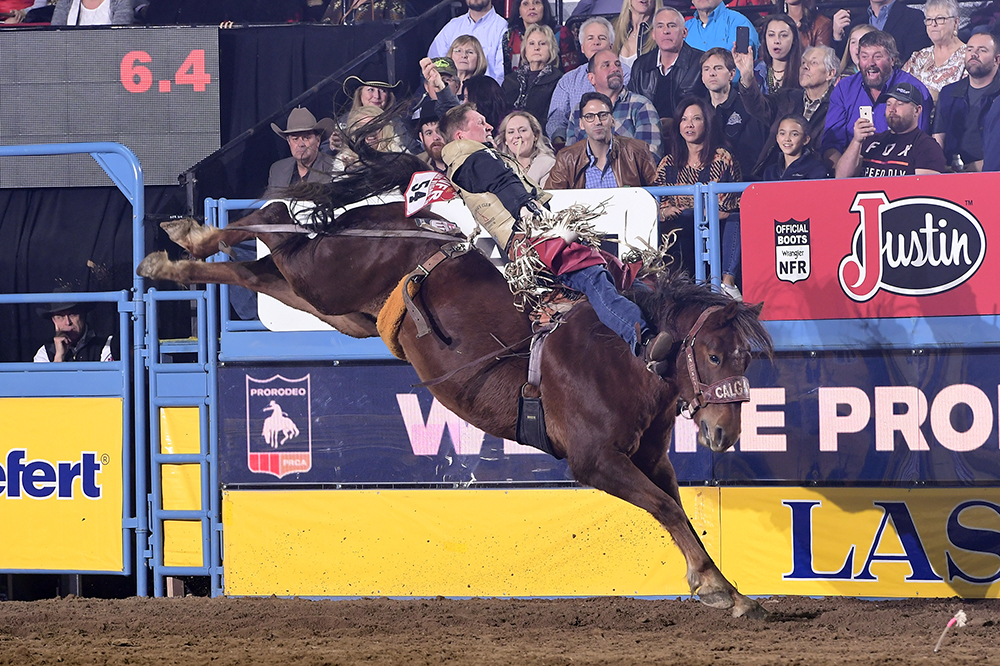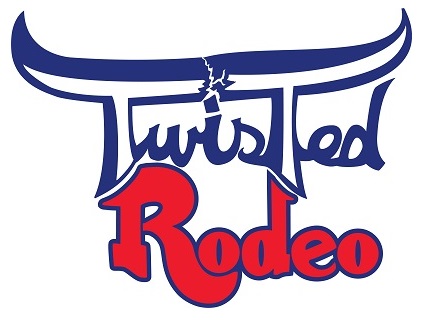
(PRCA PRORODEO PHOTO BY JAMES PHIFER)
MANDAN, N.D. – The bareback riding competition in ProRodeo continues to get tougher, with great young athletes stepping into the spotlight.
Ty Breuer is a veteran who has been around for 13 years. He’s qualified for the National Finals Rodeo seven times in his career – an injury forced him out of the 2020 championship – and he’s been one of the very best to have played the game since his inaugural year in 2010.
In 2022, he had the best campaign of his career. He closed out the regular season with $104,195 and will be 14th in the world standings when he arrives at the NFR, set for Dec. 1-10 at the Thomas & Mack Center in Las Vegas.
“This was one of the hardest years to make it to the finals,” said Breuer, 32, of Mandan, North Dakota. “There are a lot of good bareback riders. I think the key that got me through was believing all along that I was going to make it.”
Only the top 15 on the money list at the end of the regular season advance to the NFR, and this year featured unprecedented earnings. All bareback riding qualifiers have earned at least $100,000 this season. The 16th cowboy, Nevadan Wyatt Denny, earned more than $98,000 and was left on the outside looking in.
More often than not, Breuer has found himself among ProRodeo’s elite. A season ago, he closed out the campaign 19th in the world standings, just missing out on playing for the biggest pay in the game. This year’s championship features a $1.4 million purse, with go-round winners collecting nearly $29,000 for 10 nights.
“This is what we work for all year long, to get to Vegas and have a shot to ride for that kind of money,” said Breuer, who credits his success to his sponsors, Ressler Land & Cattle, Franks Diesel & Ag, McQuade Distributing, Pulse ND, Cattleman’s Club Steakhouse & Lounge, Phoenix Performance Products, D Day Trucking and Fettig Pro Rodeo.
“That’s what you compete for and what you dream of.”
It was a year-long battle, from October 2021 to the end of September this fall. In a sport where money not only helps cover expenses but also serves as championship points, he gathered dollars throughout the campaign. He closed out the season with some nice paychecks in Amarillo, Texas; Omaha, Nebraska; and Pasadena, Texas, to secure his bid for Sin City.
“I was very fortunate that I drew some good horses, and I was riding good,” he said. “That last couple weeks, were probably the funnest weeks I’ve had. I was traveling with Wyatt Denny and Mason Clements, and we were all in the same boat trying to make the NFR, and we were still rooting for each other.
“I think what helped me, too, was my experience. Toward the end, I knew I had to rodeo hard, and it all worked out. I drew good horses the last couple of weeks. I knew, from the past, that I needed to be within $2,000 of 15th (spot in the standings) the last two weeks because all the same guys were winning everywhere.”
He’s been in that position before, scrambling through September to try to make sure he earned his spot at the NFR. He’s been on the outside looking in, and he’s snuck in, but it takes something special to remain one of the best bareback riders in the game. In Breuer’s case, it came down to being pretty healthy through the rigors of the campaign.
“This is actually one of the healthiest years I’ve had,” he said. “I’ve been working out, and that helps, but I’d say some of it is luck.
“I also think the older a guy gets, the smarter you are about getting on the right horses.”
That can make a great deal of difference. Bareback riding is the most physically demanding events in rodeo. Cowboys utilize specially designed gloves with binds on the forefinger and pinky, then wedge their hands into a tight handhold on a rigging that is strapped tightly to the bronc’s back. Once in place, men are virtually locked onto the horse.
Every time the horse bucks, kicks or moves in certain ways, pressure is applied to the riding hand, elbow, shoulder and spine. To make good rides, and also to utilize that pressure in a positive force, the cowboys will spur from in front of the horse’s shoulders back to the rigging. Doing so in rhythm with the animal’s bucking motion is also a key to securing more points. The better the horses, the better the scores.
Now in his 30s, there may come a time when Breuer opts for a different way to conduct business, but that might not come soon.
“I love rodeoing, but I love ranching, and I love my family the most,” said Breuer, the 2010 Bareback Riding Resistol Rookie of the Year who also won the intercollegiate national title that year. “It gets harder and harder to rodeo, but it’s worth it at the end, especially when you get to go to Vegas for a couple of weeks and hang out together.
“It gets hard to leave home, but it also makes you ride better. You’re leaving stuff at home that needs to be done, so you need to make money to care for everything back home, and this is the way I do it.”
Life back home includes his wife, Kelli, and their three children, Kayd, 5, Treyt, 3, and Trex, 1. They continue to be the driving force behind his passion for the game. They all understand that when it’s time for Dad to go to work, he’s going to be away from home. Still, Ty Breuer makes it a priority to get back to his place near Mandan when he can.
“Probably the biggest relief I had was that when when I got on that last horse in Pasadena,” he said of the rodeo that concluded Sept. 29. “I told Kelli I wasn’t going to come home until I made the NFR, and that was the point I realized I’d made it.”
ProRodeo’s championship event is a rugged test of everything bareback riders have. They will get on broncs that test their skills, and they will face mental and physical challenges over the course of the 10-day affair in the Nevada desert. The payoff is well worth it.
“The best part of the NFR is having your family out there with you,” Breuer said. “They also go through a lot through the year so you can be there, so that’s rewarding for me.”
